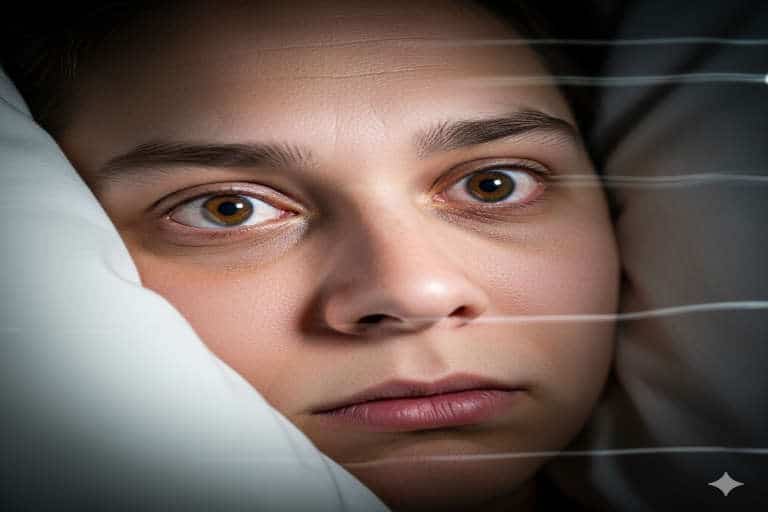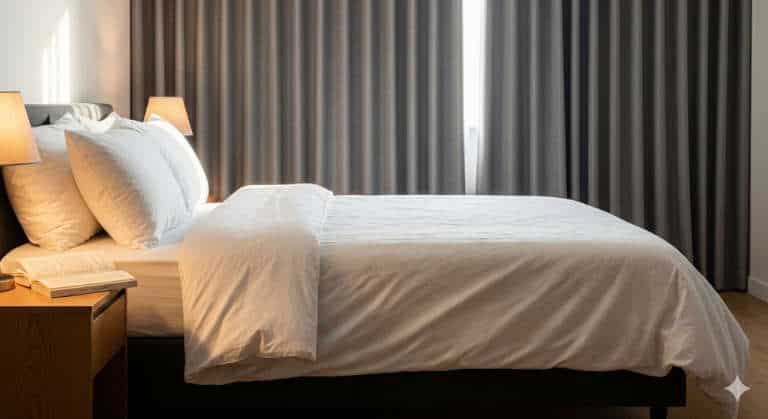Sleep Anxiety: Understanding and Overcoming the Cycle
Breaking free from the cycle of sleepless nights
Lying awake at 3am, staring at the ceiling, your body heavy with tiredness but your mind refusing to switch off, it is a scene many people know too well. The harder you try to sleep, the further away it feels. Thoughts race, tension builds, and you dread the day ahead before it has even begun.
This is what many describe as sleep anxiety. Research from Harvard Medical School highlights that up to 40% of people with insomnia also live with anxiety disorders, showing how common and under-recognised this cycle really is. One feeds the other, leaving people trapped in a loop that feels impossible to break.
But here is the important part: sleep anxiety is not permanent. With the right understanding and therapeutic support, nights can become places of rest again.

“Sleep is not something you force, it is something you allow. When fear is released, rest returns.” — Eri
What Is Sleep Anxiety?
Sleep anxiety is when worry about falling or staying asleep makes it harder to rest, creating a cycle of stress and sleeplessness.
It might start after a few restless nights, but the mind quickly learns to link bedtime with dread.
Common signs include:
- Overthinking at night, especially about the next day
- Physical tension or restlessness when trying to drift off
- Fear of being too tired or “losing control” if sleep does not come
- Panic attacks during the night or early morning
- A constant loop of worrying about not sleeping
Causes of sleep anxiety may include:
- Previous nights of poor sleep
- Stress about work, health, or relationships
- Fear of losing control or being overtired
- Trauma or past negative experiences with sleep
According to the American Academy of Sleep Medicine, this pattern is closely linked to psychophysiological insomnia, where the very anticipation of not sleeping becomes enough to prevent rest.
Why Anxiety Keeps You Awake
When anxiety takes hold, it switches on the body’s stress system. The hypothalamic, pituitary, adrenal axis, the mechanism that drives fight or flight, begins firing. Cortisol, the stress hormone, rises, melatonin, the sleep hormone, falls, and the nervous system stays on guard even in the middle of the night (Palagini et al., 2013). As reviewed by Palagini and colleagues in the Journal of Affective Disorders (2013), the stress response alters cortisol and melatonin levels in ways that make it far harder for the brain to transition into restorative sleep.
The body cannot relax into deeper, restorative sleep when it is wired to stay alert. You may feel physically exhausted, but your brain is still scanning for danger. Over time, this leaves you struggling not only to fall asleep, but also to stay asleep and feel rested in the morning.
The Vicious Cycle of Sleep Anxiety
Once sleep becomes something to fear, anticipatory anxiety sets in. You begin worrying about whether you will sleep that night long before you even get into bed. This worry keeps your nervous system alert, which only makes it harder to rest.
The result? Even when your body is tired, your brain refuses to switch off.
Poor sleep then reduces emotional resilience during the day, making anxiety feel worse. That extra anxiety makes the next night even harder. And so the cycle continues, worry, wakefulness, exhaustion, repeat.
This is where the RINTT approach comes in. Because breaking the cycle is not about forcing sleep, it is about changing the subconscious patterns that hold it in place.
Treatments for Overcoming Sleep Anxiety
The good news is that sleep anxiety responds well to treatment. Research highlights several approaches that can calm the body, retrain the brain, and support healthier rhythms. But it is also true that many people struggle when these methods are used in isolation. Each has its strengths, yet each also leaves something out, and that is where hypnotherapy, especially within the RINTT framework, brings everything together.
Cognitive Behavioural Therapy for Insomnia (CBT-I)
CBT-I is widely recognised as one of the most effective treatments for chronic insomnia. It helps people challenge negative thoughts and change behaviours around sleep, which over time can rebuild trust in the body’s natural rhythm (Qaseem et al., 2016).
However, many people find CBT-I demanding. It requires consistent practice, even on nights when anxiety is high and exhaustion has already taken hold. Some manage to change their conscious thinking but still find themselves awake at night because the deeper subconscious patterns remain untouched.
Mindfulness and Meditation
Mindfulness helps people step back from anxious thoughts instead of getting carried away by them. Research shows it can reduce stress and improve sleep quality (Black et al., 2015).
Yet mindfulness is not easy for everyone. For people caught in the grip of sleep anxiety, sitting quietly with racing thoughts can feel overwhelming. Progress often takes time, and frustration builds if results are not immediate. Without addressing the emotional imprints behind the fear of sleep, mindfulness alone may feel incomplete.
Foundational Sleep Hygiene
Good sleep hygiene, keeping regular schedules, reducing caffeine, switching off screens, and creating a calming bedtime routine, is important. These habits stabilise the body’s circadian rhythm and provide predictability that supports rest.
But sleep hygiene is often presented as a checklist, and many people try it only to find little improvement. The routines can help create the right conditions for sleep, but they cannot override a nervous system stuck in high alert or a subconscious mind that still expects danger at night.

Hypnotherapy for Sleep Anxiety: The Integrative Approach
This is where hypnotherapy, and especially the RINTT method, offers a more complete pathway. It does not only focus on thoughts, as CBT does, or on awareness, as mindfulness does, or on habits, as sleep hygiene does. Instead, it integrates the most useful aspects of each approach while also addressing the subconscious patterns that keep sleep anxiety alive.
Through guided trance and suggestion, hypnotherapy calms the nervous system, reshapes emotional imprints, and installs new associations of safety around bedtime. It weaves in the focus of CBT, the calm awareness of mindfulness, and the supportive structure of healthy routines, but does so under one umbrella that works with both mind and body.
A study published in Sleep (Cordi et al., 2014) found that just one hypnosis session significantly increased slow-wave sleep, the stage most essential for emotional and physical recovery. By targeting both the conscious and subconscious, hypnotherapy with RINTT helps not just manage symptoms but transform the cycle itself.
How RINTT™ Helps with Sleep Anxiety
RINTT™ (Reimprint Integrative Therapy) is the five-step method I developed to help people transform the emotional patterns behind challenges like sleep anxiety. Unlike quick fixes, RINTT works with the subconscious, where these patterns are stored.
Here is how it supports recovery:
Root Reveal
Together we uncover the original imprint, a memory, belief, or experience that shaped your fear of sleep or loss of control.
Inner Integration
Using tools like tapping, visualisation, or parts work, we gently process the stored emotion and restore a sense of safety inside.
Neural Rewiring
Like replacing a faulty track on a record, we install new beliefs and associations, so bedtime cues calm instead of alarm.
Transform Identity
Your self-image shifts from “I cannot sleep” to “I am someone who rests with ease.” This change becomes embodied and lasting.
Thrive Forward
You leave with practical tools and personalised support to keep reinforcing your progress long after therapy ends.
By combining neuroscience, hypnotherapy, and integrative methods, RINTT helps rewire not just how you think about sleep, but how your body and subconscious respond to it.
FAQs About Sleep Anxiety
Yes, many people fully overcome sleep anxiety, even after years of restless nights. What often makes it feel incurable is the cycle itself, the more you worry about not sleeping, the harder sleep becomes. Breaking that cycle is possible when both the body and the subconscious mind relearn that night-time is safe. Approaches such as CBT-I, mindfulness, and good sleep hygiene can all help, but lasting change usually comes from addressing the deeper patterns driving the anxiety. With integrative hypnotherapy, such as the RINTT method, people are able to calm the nervous system, reprogramme old associations, and restore a natural rhythm of rest. Sleep anxiety is not a life sentence, with the right support it can be resolved.
Not exactly. Sleep anxiety is the fear and worry about not sleeping, while insomnia is the difficulty or inability to sleep. The two conditions are closely linked, and many people experience both at the same time. Anxiety about sleep often leads to insomnia, and poor sleep then makes the anxiety worse, creating a cycle that can feel impossible to escape. This is why treating insomnia only at the surface level may not be enough. When the underlying anxiety and subconscious patterns are addressed, the cycle can be broken and natural sleep restored.
There is no single therapy that works for everyone, but research consistently highlights CBT-I and hypnotherapy as two of the most effective approaches. CBT-I focuses on changing negative thought patterns and behaviours, which helps many people but can feel demanding to maintain. Mindfulness teaches calm awareness but may not resolve the deeper subconscious fears that drive sleep anxiety. Hypnotherapy, especially when delivered within an integrative approach like RINTT, goes further by combining the strengths of these methods while directly addressing the subconscious mind. It calms the nervous system, reshapes emotional imprints, and helps restore the natural rhythm of rest, making it one of the most complete therapies available for sleep anxiety.
Natural approaches that may help with sleep anxiety include mindfulness, breathing exercises, relaxation techniques, and consistent sleep hygiene routines such as reducing caffeine, lowering evening screen time, and keeping regular sleep hours. These can all create the right conditions for rest, but many people find they only go so far if the subconscious fear of not sleeping remains. Integrative hypnotherapy, such as the RINTT approach, builds on these natural practices by working directly with the mind–body connection. It calms the nervous system, reshapes underlying emotional patterns, and helps the body relearn that night-time is safe, making it a more complete natural solution.
Final Thoughts: You Are Not Broken, You Are Wired for Safety
If you are struggling with sleep anxiety, it does not mean something is wrong with you. Your body is trying to protect you, even if that protection is no longer helpful.
CBT-I, mindfulness, and good sleep habits can all support recovery, but for many people they only address parts of the picture. The deeper change happens when the nervous system and the subconscious relearn that night-time is safe. That is why an integrative approach like RINTT hypnotherapy sits at the centre of overcoming sleep anxiety. It calms the body, reshapes old associations, and weaves in the most useful elements of other methods, so rest can return naturally.
Overcoming sleep anxiety is possible. It begins by changing the story your subconscious holds about night-time, and by giving your system the safety it needs to let go and rest.

